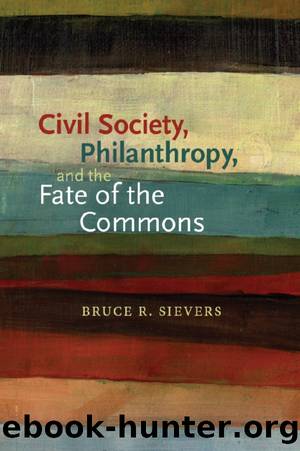Civil Society, Philanthropy, and the Fate of the Commons by Bruce R. Sievers

Author:Bruce R. Sievers [Sievers, Bruce R.]
Language: eng
Format: epub
Tags: Great Britain, Europe, Social Science, Political Science, History, Philanthropy & Charity, General
ISBN: 9781584658955
Google: uJ4IM1wnqrsC
Goodreads: 8332381
Publisher: UPNE
Published: 2010-01-15T07:22:34+00:00
The Web of American Civil Society
In the early American Republic, ancient notions of the well-being of the community and the rule of law became interwoven with new, Enlightenment-era ideas about individual rights, free expression, toleration, private associational life, and philanthropic activism and led to a new stage in the evolution of civil society. Tocqueville captured the distinctive character of this new social structure in his insightful study of American democracy, in which he examined the interplay between the autonomous actors of private associational life and the political authorities of the new democratic state. His oft-quoted observation, cited in chapter 1, about the capacity of Americans to accomplish through self-organization what Europeans sought from the state, highlights the private side of that interaction.
At the same time, Tocquevilleâs concern about the limitations of the private pursuit of the public good is also present from the very beginning of analysis of the new American democracy. On the twentieth day after his arrival in the new nation on May 29, 1831, Tocqueville penned in his diary an amazingly insightful first impression of the tension that he was beginning to perceive between private interests and the public good in this new country:
The principle of the republics of antiquity was to sacrifice private interests to the general good. In that sense one could say that they were virtuous. The principle of this one seems to be to make private interests harmonize with the general interest. A sort of refined and intelligent selfishness seems to be the pivot on which the whole machine turns. These people here do not trouble themselves to find out whether public virtue is good, but they do claim to prove that it is useful. If this latter point is true, as I think it is in part, this society can pass as enlightened but not virtuous. But up to what extent can the two principles of individual well-being and the general good in fact be merged? How far can a conscience, which one might say was based on reflection and calculation, master those political passions which are not yet born, but which certainly will be born? This is something which only the future will show.52
In this initial impression, Tocqueville displayed his remarkable prescience about the future course of the American polity. As has been seen, the subsequent unfolding of American history was characterized by an increasing tension between the private and public sides of communal life,
whether this tension concerned the assertion of rights, the exercise of free expression, the conduct of associations, the control of the media, or the administration of philanthropy. American civil society has always managed to strike a balance between private and public commitments, maintaining a strong grounding in an ethos of individual liberty while facilitating the pursuit of the common good. Major social accomplishments over the course of American historyâthe expansion of the press and educational institutions in the first half of the nineteenth century, the reform movements of the second half of that century, the gradual strengthening
Download
This site does not store any files on its server. We only index and link to content provided by other sites. Please contact the content providers to delete copyright contents if any and email us, we'll remove relevant links or contents immediately.
| Belgium | France |
| Germany | Great Britain |
| Greenland | Italy |
| Netherlands | Romania |
| Scandinavia |
Room 212 by Kate Stewart(5105)
The Crown by Robert Lacey(4807)
Endurance: Shackleton's Incredible Voyage by Alfred Lansing(4769)
The Iron Duke by The Iron Duke(4349)
The Rape of Nanking by Iris Chang(4203)
Joan of Arc by Mary Gordon(4101)
Killing England by Bill O'Reilly(3996)
Say Nothing by Patrick Radden Keefe(3975)
I'll Give You the Sun by Jandy Nelson(3429)
Shadow of Night by Deborah Harkness(3361)
Hitler's Monsters by Eric Kurlander(3329)
Mary, Queen of Scots, and the Murder of Lord Darnley by Alison Weir(3208)
Blood and Sand by Alex Von Tunzelmann(3195)
Eleanor & Park by Rainbow Rowell(3153)
Darkest Hour by Anthony McCarten(3119)
Margaret Thatcher: The Autobiography by Thatcher Margaret(3080)
Book of Life by Deborah Harkness(2933)
Red Famine: Stalin's War on Ukraine by Anne Applebaum(2929)
The One Memory of Flora Banks by Emily Barr(2857)
